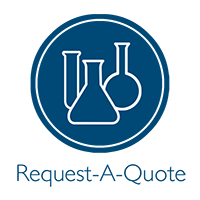This method is for the collection and analysis of enflurane, halothane, and isoflurane from workplace air. the sample is collected on an Anasorb CMS or Anasorb 747 tube. After collection, the sample is desorbed with carbon disulfide and analyzed by GC/FID (flame ionization detector).
No Obligation Quotation for Analytical Services
If you would like us to provide a quote for laboratory analysis, just provide us with as much information as you can about your project (the more, the better) and we'll provide you a quote via email. As you are searching or browsing our Analytical Guide, you'll see the Request-A-Quote icon... just click on it to start the request process.
| Hold Times, Preservatives, Preps, Collection, Analytical & Documentation | |
|---|---|
| Holding Time: | None specified in the method. |
| Preservatives: | Store samples for analysis of halothane at refrigerated temperatures from sample collection to analysis. Samples for enflurane and isoflurane can be stored at ambient or refrigerated temperatures. |
| Required Preps: | Anasorb CMS tube, 75/150mg (SKC 226-121) or Anasorb 747 tube, 70/140mg (SKC 226-81A) |
| Collection Method: | The method recommends a 0.05 L/min. flow rate with a 12L sample collection volume. |
| Analytical Methodology: | GC/FID |
| Documentation: | |
| Analyte | Formula | CAS Number | Detection Limit | |
|---|---|---|---|---|
| Enflurane | C3H2ClF5O |
13838-16-9 |
3.68 |
µg |
| Halothane | C2HBrClF3 |
151-67-7 |
2.07 |
µg |
| Isoflurane | C3H2ClF5O |
26675-46-7 |
2.13 |
µg |
* The analytes and detection limits listed for each method represent the typical detection limits and analytes reported for that particular method. Keep in mind that analyte lists may vary from laboratory to laboratory. Detection limits may also vary from lab to lab and are dependent upon the sample size, matrix, and any interferences that may be present in the sample.